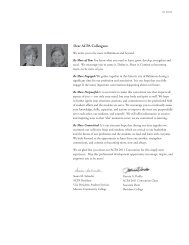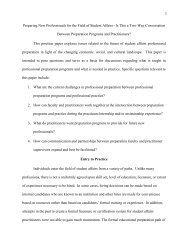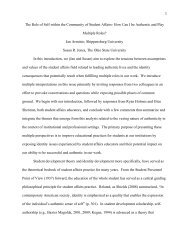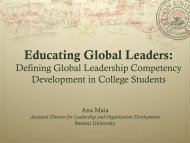Tensions around the Use of Research and Theory in Student Affairs ...
Tensions around the Use of Research and Theory in Student Affairs ...
Tensions around the Use of Research and Theory in Student Affairs ...
Create successful ePaper yourself
Turn your PDF publications into a flip-book with our unique Google optimized e-Paper software.
orig<strong>in</strong>al study is seldom a part <strong>of</strong> <strong>the</strong> discussion with<strong>in</strong> a retention committee, much less<br />
<strong>the</strong> external consultant.<br />
All <strong>the</strong>se approaches have <strong>in</strong> common a series <strong>of</strong> ethical <strong>and</strong> philosophical considerations that<br />
should be considered when work<strong>in</strong>g with students <strong>and</strong> us<strong>in</strong>g research to guide your work.<br />
Philosophical <strong>and</strong> Ethical Considerations<br />
S<strong>in</strong>ce <strong>the</strong> <strong>in</strong>ception <strong>of</strong> <strong>the</strong> field <strong>of</strong> student affairs, <strong>the</strong> belief that each student is unique<br />
<strong>and</strong> that <strong>the</strong> field should consider <strong>the</strong> student as a whole has been at <strong>the</strong> forefront <strong>of</strong> <strong>the</strong><br />
foundational beliefs (SPPV). When <strong>the</strong>se beliefs were articulated, higher education was fairly<br />
homogeneous <strong>and</strong> perhaps assum<strong>in</strong>g some commonalities was natural. This is <strong>the</strong> not <strong>the</strong> case<br />
today. The diversity <strong>of</strong> higher education <strong>and</strong> <strong>the</strong> diversity with<strong>in</strong> <strong>the</strong> field <strong>of</strong> student affairs<br />
require practitioners to question almost any common practice. Some <strong>of</strong> <strong>the</strong>se examples were<br />
illustrated previously <strong>in</strong> <strong>the</strong> common trends. This section seeks to consider when perhaps<br />
research should not be applied.<br />
There are times when a research f<strong>in</strong>d<strong>in</strong>g is compell<strong>in</strong>g, yet <strong>the</strong> application <strong>of</strong> <strong>the</strong> f<strong>in</strong>d<strong>in</strong>g<br />
would exclude some students from higher education. An example <strong>of</strong> this is <strong>around</strong> <strong>the</strong> need for<br />
developmental, or remedial, education. While <strong>the</strong>re is evidence that a student who is <strong>in</strong> <strong>the</strong><br />
marg<strong>in</strong>s <strong>of</strong> be<strong>in</strong>g college ready (placement score) will receive some benefit from be<strong>in</strong>g assigned<br />
to a remedial course, <strong>the</strong> research seems to say that <strong>the</strong>ir long-term process towards earn<strong>in</strong>g a<br />
degree is not helped by remediation (Calcagno & Long, 2008). Even though this study uses very<br />
sophisticated analysis, it does not actually provide much long-term hope for students <strong>in</strong> remedial<br />
education. The authors recommend reconsider<strong>in</strong>g <strong>the</strong> fund<strong>in</strong>g <strong>of</strong> remedial education given <strong>the</strong><br />
limited outcomes. For community colleges practitioners who have open access admissions <strong>and</strong><br />
attract students who need remediation – what should <strong>the</strong>y do with this research f<strong>in</strong>d<strong>in</strong>g? The<br />
Page 5 <strong>of</strong> 12
















